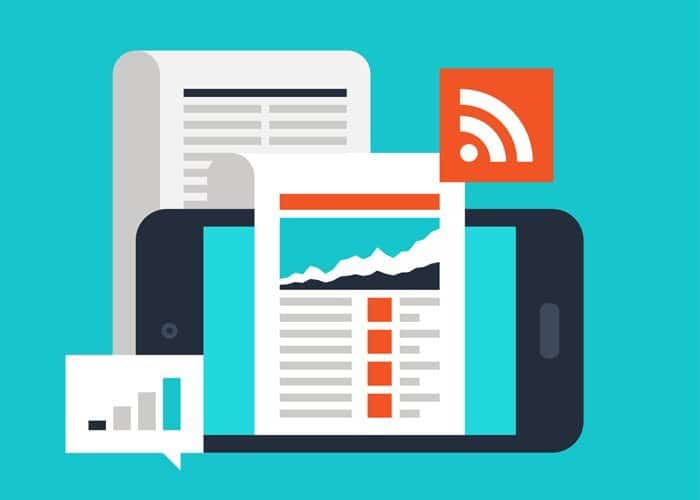WHAT IS DIGITAL PUBLISHING?

When you think of the definition of digital publishing, maybe the first things that comes to mind are blogs or ebooks.
But you’d be surprised at all the forms digital media and digital publishing can take.
Digital publishing started in 1971 when Project Gutenberg was launched with the digitalisation of the US Declaration of Independence. Since then, it has grown substantially and has evolved into a force that has taken on conventional publishing, encompassing books, music, video, audio, news, video games, mobile apps and more.
Digital and media publishing definition
When talking about something digital, we are discussing something that involves computers. That could mean anything from the Internet to the latest game you played on your smartphone to the response to a question you just asked a digital assistant like Siri. All of these are possible because of digital technology. Without a computer and your smartphone qualifies as a computer — you wouldn’t be able to have that technology directly at your fingertips.
 Media is something that we, as humans, use to communicate with. Media can be paper and includes magazines, newspapers, books, and documents.
Media is something that we, as humans, use to communicate with. Media can be paper and includes magazines, newspapers, books, and documents.
But it can also include artwork, and so canvases, stone, clay, and metal can become media when they convey ideas.
Broadcasts of television and radio shows, movies, news, music, and other information occur within the broadcast medium, thus making broadcasts a form of media.
Digital media and digital publishing explained
When you combine the two words “Digital” and “Media,” you then see that digital media is media that uses computers to convey the ideas.
Since publishing is the act of providing digital media to the public, we can assume that digital publishing is the act to provide media to the public via computers.
This means that any information published on the web, in Ezines, on blogs, for Ereaders, or as games are all part of digital media and the companies that provide them are digital publishers.
Digital publishing examples
In this way, we can see that Amazon.com’s Ereader, Kindle, and their self- publishing platform, Kindle Direct Publishing, are part of digital publishing.
People create games and apps and have them published in the Google Play Store.
Musicians record their music into MP3 files and upload them to iTunes which will digitally publish their music and make it available to iPods, iPhones, and other players.
When you listen to Pandora, Spotify, or any other online music service, you take advantage of their distribution network which is a form of digital publishing.
When you look at digital images created in Adobe Illustrator or Adobe Photoshop, you see artwork that has been digitally published.

Blog platforms like WordPress.com or social media platforms like Twitter or Instagram make available to everyone the necessary tools for digital publishing.
Each time someone posts a picture to Instagram or Snapchat, publish a tweet or share your thoughts on Medium, they are engaging in an act of digital publishing. As they are doing it in large numbers: each day, 95 million pictures and videos are shared in Instagram, and 500 million tweets are sent.
Forms of digital media
Naturally, the medium of digital publishing is different than conventional forms of publishing, but that isn’t where the differences end.
In digital publishing ebooks, you aren’t restricted by the length of the work as you would in conventional publishing. Conventional novels can be anywhere from 50,000 words to more than 300,000 words but seldom go above or below those numbers because of the cost of printing. Ebooks, however, can be any length the author feels is appropriate.
This opens a lot of possibilities for authors and publishers.
Tor.com, a science-fiction and fantasy publisher, often publishes shorter works of fiction as novellas for ebooks.
John Scalzi, a science-fiction author famously released one of his novels as a series of standalone ebooks, one per chapter.
They were later collected and republished as a conventional novel.
 In newspapers and magazines, the concern is about how many inches the article can be in order to fit in advertisers.
In newspapers and magazines, the concern is about how many inches the article can be in order to fit in advertisers.
In editorials, blogs and digital newspapers, while the stories may be short simply because the audience may not read all of it, they are not constrained by the overall length of the medium.
They also don’t have the constraint of having to fill a determinate number of pages. From a digital newspaper site, you can access all the articles ever published on their print edition.
The same can be said for music and videos released on the Internet.
At the same time, publication time has been slashed to almost nothing.
Publishers no longer have to wait for production lag times. Because of this, digital media can be published quickly, usually with no more delay than one or two days once the production editing is completed.
In this way, digital publishing continues to expand and grow. 25% of all book sales in 2018 were for ebooks, up from 12% in 2013.
Three-quarters of subscribers to newspapers like the Financial Times and the New York Times are paying for digital-only subscriptions, and even local newspapers like the Boston Globe have more digital than print subscribers. Besides the growth of digital subscription, audio (like podcasts or voice search) and the use of artificial intelligence in publishing (like voice assistants or language processing for categorising content automatically) are two of the biggest trends in digital publishing now.
This Information Brought To You By Vickispot Researcher and Marketer

No comments:
Post a Comment